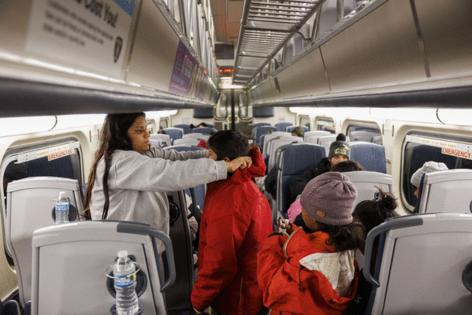With climate change coming, Chicago's current migrant influx 'only going to be the beginning'
Published in News & Features
CHICAGO — More than 44,000 migrants have been sent to Chicago by bus or plane over the last two years and the city’s struggle to keep them housed, fed and safe has stretched resources and sparked fierce debate over how scarce tax dollars are spent.
But the largely man-made influx where asylum-seekers have been sent from Texas to cities like Chicago is likely “only going to be the beginning,” of migrant movements as climate concerns continue to escalate, Alderman Andre Vasquez, 40th, predicted Tuesday.
Aldermen on Tuesday weighed the prospect of future climate change-related disasters pushing people to the city during a City Council Immigration Committee hearing. Providing both warnings and recommendations, migration experts argued the arrival of future migrant influxes is only a question of when.
Cities such as Chicago with access to bodies of fresh water are set to fare better with climate change and as a result will see migration increases, said Vasquez, the committee’s chair.
“As we’ve experienced, governments are not prepared to address huge influxes of migration,” he said. “But this is the direction things are going in, whether a city is prepared or not.”
Chicago’s current migrant housing challenges began when Republican Gov. Greg Abbott of Texas began to send mostly Venezuelan migrants by bus to the city in August 2022. The city has since spent about $400 million caring for the newcomers.
That caretaking effort has seen relative calm in recent weeks as the number of new arrivals and people living in city- and state-run shelters has steadily declined. There are 5,950 people living in the shelters, down from around 15,000 at the beginning of the year.
Climate change has already brought migrants and other newcomers to Chicago, including disasters such as Hurricane Katrina in 2005 and Hurricane Maria in 2017, said Dulce Guzmán, deputy director of institutional development at migrant coalition group Alianza Américas.
Those who arrive in Chicago often need housing or work and have to do so practically from scratch after having lost everything from their support structure to their cars. But governments struggle to quickly connect them with the resources they need, Guzmán said. They might come after a single major disaster or from “decadeslong, steady movements,” she added.
“As the effects of climate change worsen, no communities sending or receiving will be immune from climate threat,” Guzmán said.
...continued
©2024 Chicago Tribune. Visit chicagotribune.com. Distributed by Tribune Content Agency, LLC.







Comments